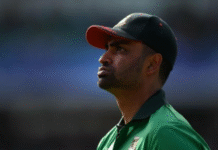The first and third sessions of the day, which brought Bangladesh five wickets with two new balls, brought the spotlight on to the pace bowlers, of whom very little was expected even from the chief selector a month ago
Bangladesh’s most promising period in this Test match so far has been bowling with the new ball. They had Sri Lanka on the ropes in the first session of the second day with three wickets and later when they took the second new ball, two more wickets kept them in the game. The two periods brought the spotlight on to the pace bowlers, of whom very little was expected even from the chief selector a month ago.
Robiul Islam and Abul Hasan led the way in the morning, keeping the scoring rate below three runs per over, and taking a wicket each. Robiul bowled eight overs on the trot and, though slightly expensive, his fuller length drew the batsmen into plenty of shots. Lahiru Thirimanne was his scalp, brought out to defend a length ball but he gave an edge to the wicketkeeper. Abul probably bowled his second decent spell in his fledgling Test career, also drawing shots from the batsmen and with more pace he beat them often.
It was because of the pressure they had created that Mushfiqur Rahim could bring Sohag Gazi into the attack quite late, and it was the control of the pace bowlers that gave the offspinner the wicket of Angelo Mathews just before lunch.
The opening burst should have brought Bangladesh more success, but Robiul’s four overs in the middle session were just used to contain the batsmen and he only returned to field for a few overs in the final session after he had suffered severe cramps on his lower limbs. Abul too tapered off, bowling three more spells throughout the day without picking a wicket. He had a little more zing with the second new ball, but it was Rubel Hossain who took the two late wickets of Dinesh Chandimal and Kithuruwan Vithanage.
Fitness of the pace bowlers has been called into question, publicly, by the selectors. Chief selector Akram Khan called the department a “blind spot” last month when asked whether he had a combination in mind for the Sri Lanka tour.
It was a question posed to him during the BPL, a tournament in which none of the pace bowlers playing in this Test match fared well. Robiul didn’t get himself a contract while Abul was hardly ever used by Duronto Rajshahi. Rubel took 14 wickets, but it was never going to be enough bowling ahead of a two-match Test series.
During the BPL, Robiul trained at the BCB’s National Cricket Academy for four weeks but the last time he bowled in a competitive game, before this series, was on January 8. It has taken him more than two months to return to the cricket field and he will not bowl in another competitive game until the first Test in Zimbabwe, if he is selected.
What brought him into the national side in this series are the 29 wickets he took in seven first-class matches this season. Robiul survives on his years of gathering skill and the knowledge of bowling long spells. Having fought for a place in the Khulna Division team in the country’s domestic competition, he has enough first-class experience to understand the needs of a fast bowler in the middle of a game or at the end. The same, at least this season, cannot be said of the other two bowlers.
Rubel had recovered from a shoulder injury at the start of the season, and played only three first-class matches other than the two Tests against West Indies. He raised his pace from time to time, but he is still not the bowler who could bowl at 140 kmph at the fag end of the day. It requires bowling volume, so if he stays fit, the next season could be a crucial one.
Abul meanwhile is playing in his 12th first-class match, which is staggering considering the number of matches bowlers go through in countries like England and Australia before being considered Test quality. Those who rush these fast bowlers on to the big stage would say that Bangladesh can’t afford to wait for a fast bowler to grow any older. Abul is a product of the Dhaka Premier League, which is a one-day tournament. Though there is pressure in the club scene, it cannot be intense enough for a fast bowler playing in a Test match.
One wouldn’t expect any of these pace bowlers to give more than what he did on the second day though. They have the third day to bowl on and if the batsmen can give them a target to defend, perhaps more bowling is in the offing on the fifth day too. Bowling plenty of overs in domestic cricket has taught someone like Robiul the methods to put in use. Rubel and Abul have to pick up nuances, teach themselves and then implement it all in their bowling. All in a Test match.
Source: CricInfo










